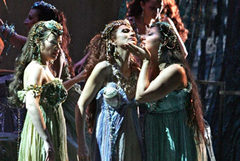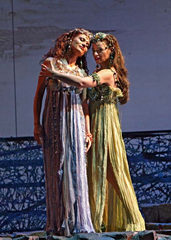| Opera Reviews | 2 May 2024 |
| Alfano's
Sanskrit opera revived in Rome by Silvia Luraghi |
|
| Alfano: La leggenda di Sakùntala Teatro dell'Opera di Roma 21 April 2006 |
|
|
The libretto, written by the composer, is inspired by the classical Sanskrit drama Sakùntala by Kalidasa. Sakùntala is a girl who has been found abandoned and brought up by a hermit, Kanva. When the king meets her, the two fall in love. But Durvasas, who is not allowed into the monastry by Sakùntala, casts an evil spell on the girl: the king will not recognize her, unless she shows him the ring he has given her during their encounter. Kanva finally returns to the monastry and learns about Sakùntala's love for the king. He knows from a prophecy that Sankuntala will have a child from the King, who will acomplish great deeds, and allows the girl to leave and look for her lover. The King cannot recognize Sakùntala, who has lost the ring and leaves in despair. When two men find the ring the King suddenly remembers, but the girl has cast herself from a cliff, and has disappeared on a cloud of fire. The King mourns her death, but all of a sudden he hears her voice, telling him that their son had to be born out of her sacrifice. The child is brought inside by the hermit, while the music celebrates his future deeds. La leggenda di Sakùntala premiered in Bologna in 1921, while Alfano was teaching at the local conservatory, and was revised by the composer for the 1951 performance in Rome, conducted by Gianandrea Gavazzeni (the revision concerned some parts of the score that had been destroyed and lost duering the second world war). Since then, the opera has never been heard again on an Italian stage. |
|
|
Tenor David Rendall in the role of the king was her peer: he managed the long stretches sung in the passaggio with ringing voice, never losing control. Orlin Anastassov was an impressive Kanva, both vocally and visually. Among the other singers, Elena Cassian also deserves to be mentioned. The mezzo, in the role of Sakùntala's friend Priyamvada impressed with the beautiful color of her voice. Maestro Gelmetti also took charge of the production, which he directed with costumes by Anna Biagiotti and sets by Maurizio Varamo. The action was set in a sort of mythical India, as Europeans imagined it at the turn of the 20th century, and the scenes heavily relied on atmospheres from Moreaux' symbolistic paintings. One could have expected more from the lights (by Vinicio Cheli). In the finale, Sakùntala's son, who was a five year old boy, walked in, rather than as a baby carried by Kanva. The ringing of the bells to celebrate the future hero and the child almost naked walking in the light resulted in a half new age half science fiction effect. Gelmetti wanted actress Gaia De Laurenti to read a summary of the plot before each act, an idea which was not well received by the audience, and ultimately proved to have little value. The level of the performance in general was very high, and it is regretable that only a handful of people attended the opening night. But this is unfortunately not unusual at the teatro dell'Opera di Roma. |
|
| © 2006 Silvia Luraghi |

 With Franco Alfano's seldom performed opera La leggenda di Sakùntala
Rome's Teatro dell'Opera continued its commitment to the re-discovery
of 20th century Italian opera. Written in the early Twenties, Alfano's
score echoes contemporary French music, especially in the vocal writing
which resembles to a certain extent Debussy's, but is also close to
Ravel.
With Franco Alfano's seldom performed opera La leggenda di Sakùntala
Rome's Teatro dell'Opera continued its commitment to the re-discovery
of 20th century Italian opera. Written in the early Twenties, Alfano's
score echoes contemporary French music, especially in the vocal writing
which resembles to a certain extent Debussy's, but is also close to
Ravel.  The
present production was muscially very well prepared. The Orschestra del
teatro dell'Opera di Roma played at its best under the baton of verismo
champion Gianluigi Gelmetti. In the title role, Francesca Patané was able
to master the killing tessitura with perfect technical skills. Her lush
voice adapts in a most satisfying manner to the demands of verismo, as
she has already demonstrated in several other occasions, most recently
in Montemezzi's L'amore dei tre re, which she sang with great success
a year ago in Turin.
The
present production was muscially very well prepared. The Orschestra del
teatro dell'Opera di Roma played at its best under the baton of verismo
champion Gianluigi Gelmetti. In the title role, Francesca Patané was able
to master the killing tessitura with perfect technical skills. Her lush
voice adapts in a most satisfying manner to the demands of verismo, as
she has already demonstrated in several other occasions, most recently
in Montemezzi's L'amore dei tre re, which she sang with great success
a year ago in Turin. 





